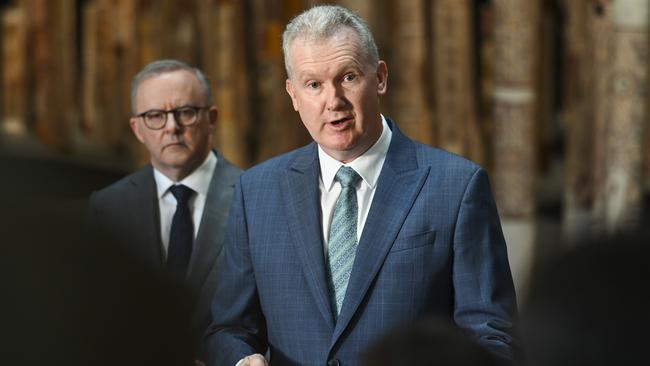BHP warns of $1.3b labour hire hit
Mining giant BHP has clashed with the Albanese government and unions over proposed same job, same pay laws.

BHP has clashed with the Albanese government and unions after the mining giant warned proposed same job, same pay laws would cost the company up to $1.3bn annually, and could cause labour hire demand to “drop off a cliff”.
Employment and Workplace Relations Minister Tony Burke questioned the credibility of BHP’s costing on Monday, given that the legislation had not been finalised or written.
And mining unions said the company was right to fear the changes would lift its wages bill, as it had been “exploiting labour hire mineworkers for years”.

“If rushed through without consideration of its broad-reaching economic consequences, same job, same pay will discourage enterprise bargaining, drive inflation, undermine productivity, threaten jobs and undermine the government’s recent bargaining reforms, which have not yet had a chance to take effect” BHP said in a statement on Monday.
Responding to the government’s consultation paper about the changes, BHP said the $1.3bn financial impact was equivalent to the labour cost of approximately 5000 full-time employees across its operational workforce.
“Sudden and extreme structural changes to laws regulating labour hire and service contractor arrangements – as foreshadowed under SJSP – will reduce flexibility, increase economic risk, and ultimately impact the cost profile of operating in Australia,” it said in its statement.
“For BHP, we estimate that the financial impact of paying all workers on our sites at the highest prevailing enterprise agreement rate to be up to $1.3bn annually,” the company added.
“In order to address a cost impact of this magnitude, we will clearly need to review its implications for our Australian operations and the workforce that supports it.”
Mr Burke said it was “unclear how BHP has produced a costing on legislation that has not yet been finalised or written”.
“If you close a loophole to stop workers being ripped off it will result in an increase in the wages budget of any company that was using the loophole. We make no apologies for that,” he said.
“The details of this policy are not yet settled. That is the point of the consultation we’re doing with BHP and others,” he added.
“But as a miner said to me in the Hunter Valley this week – how can you have an industry where because of a labour hire loophole, casual workers are paid less than permanent workers who do the same job?”

Mining and Energy Union president Tony Maher said BHP had replaced thousands of good, permanent mining jobs with insecure, lower-paid labour hire jobs.
“Along with other big mining companies, they (BHP) have exploited weak laws allowing them to avoid paying the wages and conditions achieved through genuine enterprise bargaining,” Mr Maher said
“Same job, same pay laws will close this loophole.
“Our mining companies have been pocketing billions in record profits from Australian commodities and they can afford to do the right thing by the workers generating that wealth.”
Australian Manufacturing Workers Union national secretary Steve Murphy said the new laws would “get wages moving” and improve workers’ access to bargaining.
“No one trusts what BHP has to say,” he said.
“BHP set up dodgy labour hire companies to undermine secure jobs, EBA rates and skills. It’s money out of workers’ pockets to prop up their offensive profit.”
In its response, BHP said it “supports targeted policies designed to protect vulnerable labour hire workers from exploitation, but added: “However, the proposed SJSP policy strays far beyond this objective and, as a result, threatens serious damage to every level of the Australian economy.”
By fixing labour costs in any particular location to the highest rates of pay, without corresponding productivity gains, the changes would “create unsustainable cost pressures that will further erode Australia’s competitiveness as an investment destination”, the company said.
“Australia already has some of the highest labour costs of any major mining nation, and within Australia mining workers are among the nation’s highest-paid, with average wages around $148,000 a year, compared to $96,800 across all industries,” BHP’s statement added.
“SJSP will add to inflationary pressures by ratcheting up wages without any link to productivity and it will introduce economic uncertainty by interfering in the competitive labour market.”
BHP said the changes directly undermined BHP’s operations services division and the ability to create a further 2000 jobs over the next two to three years.
“In the face of global economic headwinds, Australia needs an industrial relations system that delivers productivity, flexibility and competitiveness to drive job creation and wage growth,” it said.
“Instead, SJSP is shaping as a policy which is driven by ideology, not economics, and a policy which has wandered well beyond the limited circumstances of the problem it was trying to solve.”








To join the conversation, please log in. Don't have an account? Register
Join the conversation, you are commenting as Logout